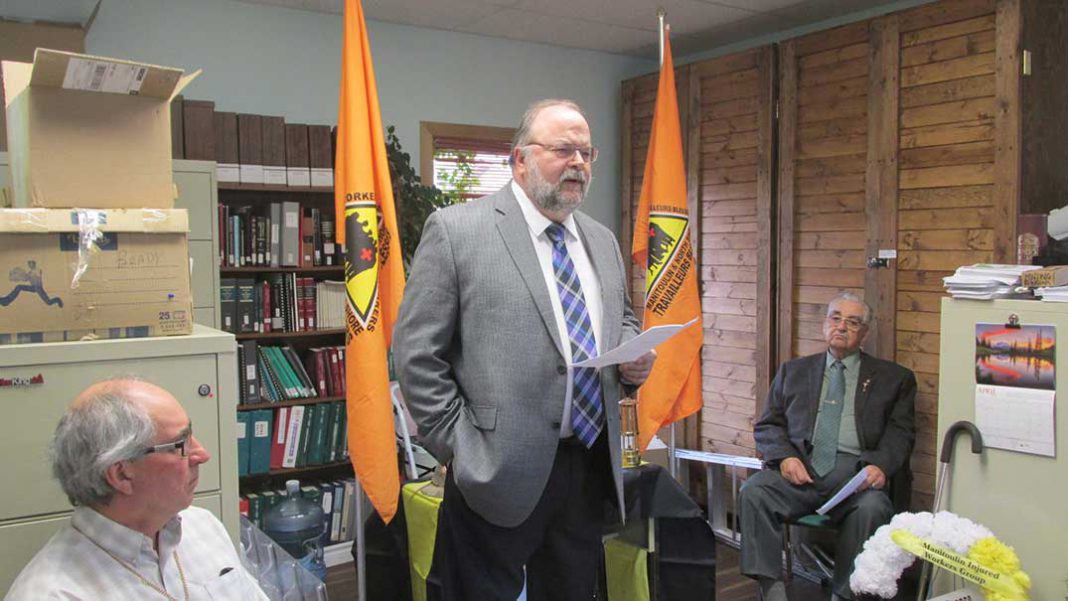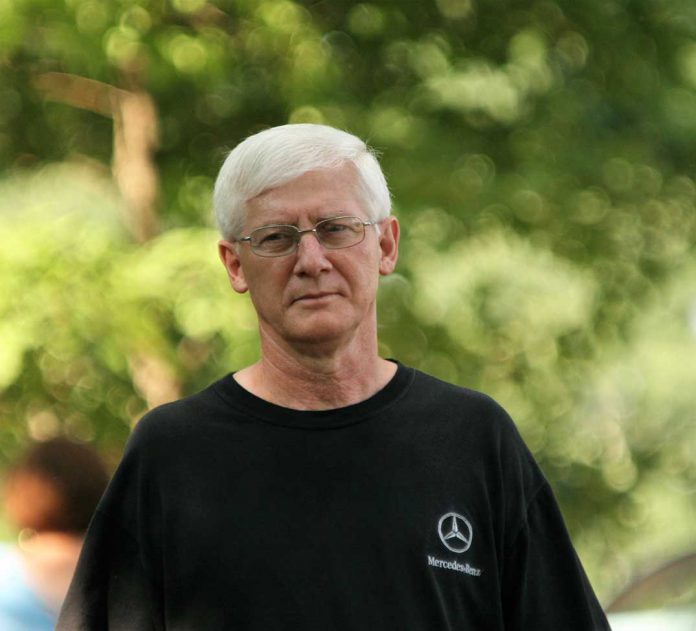AUNDECK OMNI KANING—The executive director of the Manitoulin Legal Clinic and a member of the Manitoulin North Shore Injured Workers Group (MNSIWG) says it is time for a national inquiry to be undertaken to examine the issue of why there are so many deaths and injuries that take place in the workplace.
Michael Shain told those who gathered for the MNSIWG fifth annual National Day of Mourning in Aundeck Omni Kaning last Saturday, “I was shocked a few months ago by something I read. It came for a book by Christian Appy, entitled Working Class War: American Combat Soldiers and Vietnam, published in 1993 by the University of North Carolina press. There was a paragraph in the book that stopped me cold, and that was the following: from 1961 to 1972 an average of 14,000 American workers died every year from industrial accidents; the same number of soldiers died in Vietnam during 1968 the year of highest US casualties. Throughout the war, moreover, at least 100,000 people died each year from work related diseases.”
“I put the book down,” said Mr. Shain. “I had never before made the connection between soldiers in war and workers who go to their job in the mine or factory. It disturbed me first of all that there would be this correlation made between going into combat and going to work. But it disturbed me all the more when I thought about the relative silence with which we deal with the casualties of the workplace. Those of you who lived through the 1960s and early 1970s will remember the widespread protests against the Vietnam War, against all the evil associated with war, and death and destruction, but in particular the thousands of young men who were essentially killed for nothing.”
“I reflected that it was truly a very sad time in history, but I was left wondering, what about the workers who were killed during that time, in their own country, at their workplace, and who continue to be killed up to the present day? There were never any widespread protests for them, and still there are no such protests. They never got a national monument in Washington with their names carved in black granite,” said Mr. Shain. “The inevitable answer seems to be that workers don’t count. Workers lives don’t matter. And the proof for this statement is that if they did matter, workers would not continue to be dying as they are in our country, in America and across the world.”
“There is something fundamentally wrong with our society when the lives of workers don’t matter,” stated Mr. Shain. “I have often heard politicians says that in fact we are a caring society. We care about worker safety and have passed laws to protect workers. My response is that, yes we have occupational health and safety laws, but this obviously isn’t enough. Because workers continue to be killed and injured in their workplaces.”
“If we were a truly caring society we would get to the bottom of why this problem persists,” said Mr. Shain. “We need a national inquiry into why, despite our laws designed to protect workers, why do workers continue to get killed and injured on the job, every day of every week throughout the year.”
“Most importantly, we need to see these workers not in the abstract, but as our sons and daughters, mothers and fathers,” said Mr. Shain. “Maybe this is the way to shake off the culture of apathy that seems to infect our society when it comes to the issue of workers continuing to be injured and killed in the workplace.”
Mr. Shain said, “we need to understand that there are things that are wrong in our society that need to be fixed in order to give substance to the truth that all lives matter. Because there is something wrong when going to work involves the same level of risk to health and safety as going to war.”
“There is something wrong when we as a society are so complacent with the ongoing tragedy of workers killed and injured on the job, that our response is silence. It’s as if we see this somehow as the cost of doing business and this is perverse,” stated Mr. Shain. “There is something wrong when business and industry view labour as an expense to business, rather than as the human assets that they truly are. There is something wrong when corporate profit and workplace safety are competing values, rather than complimentary ones.”
“There is something wrong when the operating minds behind a business are allowed to shelter behind a corporate structure when choosing profit at the expense of worker safety,” he said. “There is something wrong when our provincial government turns a blind eye when the Workplace Safety and Insurance Board makes policy decisions that are deliberately designed to save employers money while unfairly restricting the benefits that should be due and owing to injured workers.”
“There is something wrong when the majority of workers whose injuries are such that they are unable to return to their job end up living in poverty,” said Mr. Shain. “I could go on, but this is a day of mourning, a day to remember those who have been killed or injured on the job, but having said that, we need to acknowledge that so much needs to change. We can’t allow this tragedy to keep on happening. We need to come together and lobby both levels of government to make a start toward truly examining this problem, and taking concrete steps to end it. A national inquiry would be a first good step.”
See next week’s Recorder for additional coverage and pictures of the Day of Mourning event.





